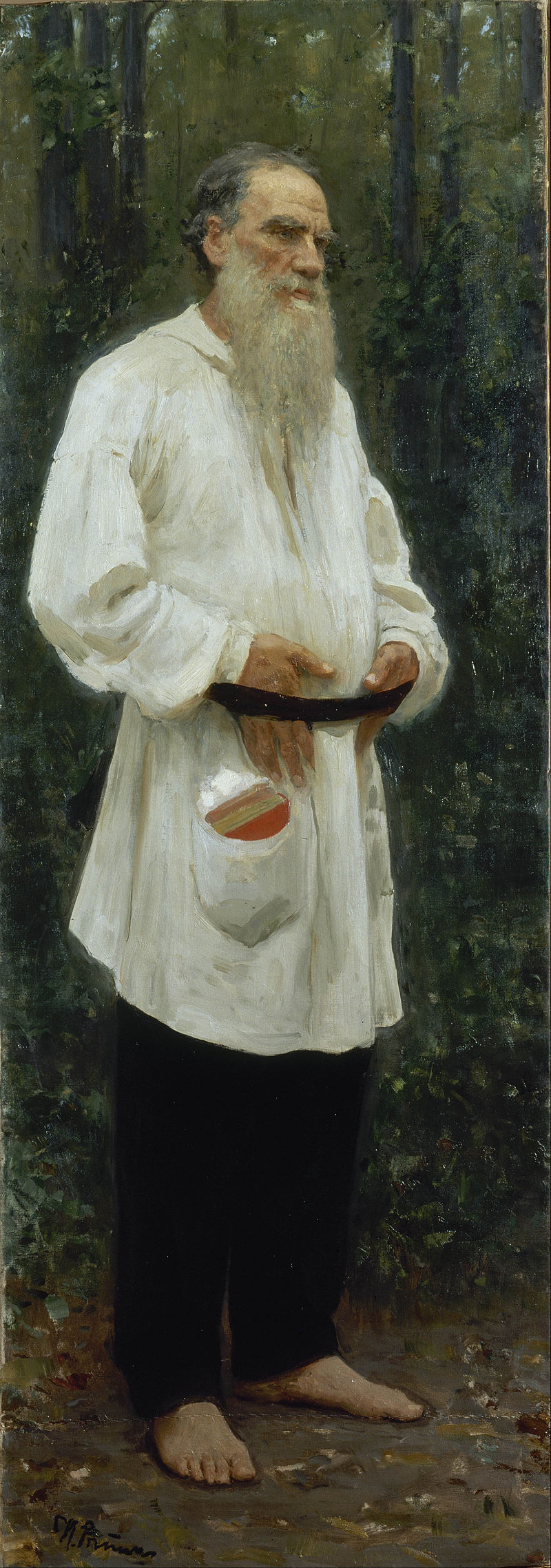Leo Tolstoy Archive
Written: 1862
Source: From RevoltLib.com
Transcription/Markup: Andy Carloff
Online Source: RevoltLib.com; 2021

[1] Dvorovaya dyevka, the daughter of a serf attached to the bar sky dvor, or mansion-house.
[2] Alekse'i Vasiiyevitch Koltsof (1809-1842), a distinguished poet, by some called the Burns of Russia.
[3] The ponomar, or paramonar, a word derived from modern Greek, airl signifying doorkeeper, sacristan.
[4] One of the domestic servants, formerly serfs, like the little girl mentioned.
[5] Dvorovui, or domestic servant.
[6] Dvornik, generally one who serves in a dvor; also house-porter. Here, one who occupies a dvor, including house and land.
[7] Little Olga.
[8] The fantastic story of a beautiful and wealthy maiden who is in reality a witch, and causes the destruction of the groom who falls in love with her.
[9] Diminutive of Feodor, Theodore; as Semka is of Semyon.
[10] Fifty sazhen.
[11] Contemptuous diminutive of Gavriil, Gabriel.
[12] Batya, shortened form of batenka, little father.
[13] Pra-a-a-shchalte.
[14] Proshchai, a more familiar form than proshchaite. 8 Prozhzhonnui yeruiga, a "burnt-out debauchee."
[15] Dvorniki.
[16] Batya, familiar for batenka, diminutive of atyets, father.
[17] Babushki.
[18] Dyadenka, little uncle.
[19] Gneditch's.
[20] Builinas.
[21] Dumplings, a Malo-Russian dish.
[22] Diminutives of Marfa (Martha) and Olga. 2 Diminutive of Praskovya.
[23] In Russian an unaccented o is pronounced like a.
[24] In the Russian construction builo is impersonal.
[25] "It opened," as of a door.
[26] The concrete examples given by Count Tolstoy would be meaningless in English.
[27] PosJili, shli, shli, nasihishka nashli.
[28] Zdravstvulte gospoda: literally, "gentlemen"; but a peasant always addresses or speaks of a superior as "they."
[29] Kalatchi, small loaves of white bread; kalatchi is one of the few Tartar words that have survived in Russian.
[30] Batya, papa; bat\ pa. Below, when speaking about the church, he calls his father batyushka, which is also the respectful address to a priest.
[31] About nine and a quarter miles. He says: Yekhali, yekkali, proyekhali.
[32] Kalatchi.
[33] A ten-kopeck piece.
[34] From Grisha, diminutive of Grigori, Gregory.
[35] From the copy-book of I. F.
[36] In Russian, Revekka, Isaf, and lakof.
[37] Na batyushka.
[38] From the book of the eight-year-old boy F .
[39] Russian, Rubim. 2 Potiphar.
[40] From the note -book of the lad I. M.
[41] The historic druzhina, from drug, a friend.
[42] A pud is 36.11 pounds avoirdupois; a grivna is ten kopecks, the tenth of a ruble.
[43] 1378 A.D., when Dmitri, Grand Prince of Moscow, conquered the Tartars and expelled them from Northern Europe.
[44] 1612, the accession of Mikhail Romanof under the patriotic lead of the butcher Minin and the Prince Pozharsky after the terrible anarchy that followed the death of the Polish pretender; 1812, the conquest of Napoleon and the French by the Russian national hero Moroz, "Frost"
[45] 1862.
[46] Russia is divided into guberniya (governments), which are subdivided into districts, somewhat like states and counties.
[47] In Russian the same word zemlya (as in Novaya Zemlya) means estate, land or country, and the earth.
[48] Koziuki means with us the class of the meshchanin, or burgess. AUTHOR'S NOTE.
[49] Tula is one of the centers of the samovar manufacture.
[50] Nek/iris ti.
[51] Sie haben ganz Russisch erz'dhlt.
[52] Sie haben nichts gesagt -von den Deutschen Freiheitskampfen.
[53] Lirizm.
[54] We beg leave to call the reader's attention to this ugly picture, so remarkable by reason of its strength of religious and poetic feeling; it bears the same relation to contemporaneous Russian painting as the art of Fra Beato Angelico bears to the art of the successors of the school of Michelangelo. AUTHOR'S NOTE.
[55] As beneath an apple tree.
[56] The Lord have mercy.
[57] Emile Joseph Maurice Cheve, 1804-1864.
[58] Krikun, from krik, a clamor.
[59] Glory to the Father.
[60] Kroshka, crumb; Kiryushka is the diminutive of Kirill.
[61] Johann Friedrich Franz Burgmuller, 1806-1874.